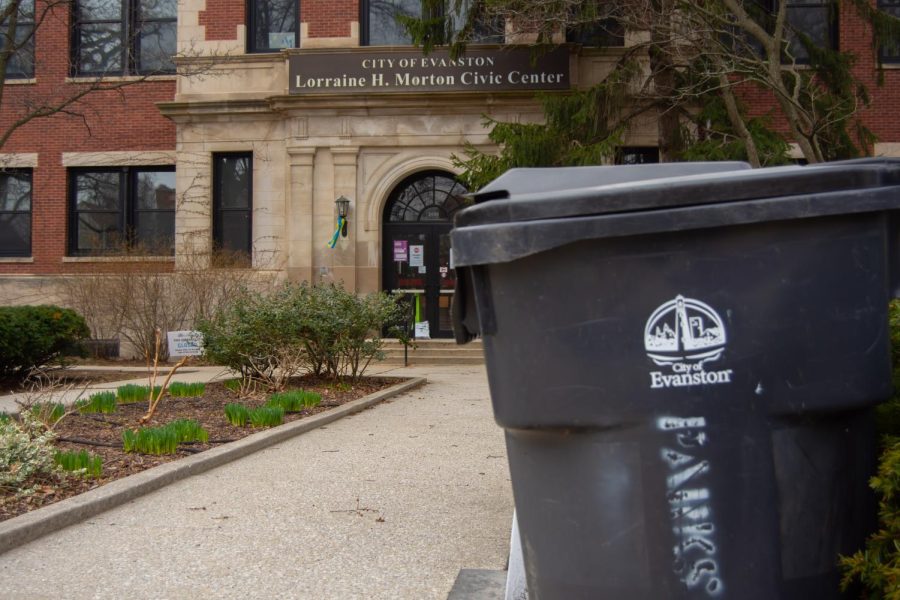Year in Review: top stories in Evanston of the last year
Daily file photo by Mika Ellison
The Lorraine H. Morton Civic Center.
August 12, 2022
In the last year, Evanston has looked to reckon with its racist history by kicking off a Restorative Housing Program, introduced mental health initiatives to provide policing alternatives and has aimed to pack its downtown with office buildings, threatening small businesses that are fighting rising food costs.
Here are some of the top city headlines from the past year you need to know about your new home.
Community members rally around local businesses
As inflation surged and food prices soared, residents rallied around many of their favorite small businesses like juice shop 4 Suns Fresh Juice and Jamaican soul restaurant Jennifer’s Edibles through GoFundMe fundraisers. They also banded together on social media groups — such as the Support Evanston Shops, Salons and Studios and Support Evanston Restaurants Facebook groups — to drive up sales at local stores.
Consumer prices in the Chicago area rose 6.6% in 2021, on par with the 7% national hike. For local restaurants and businesses, new spikes in food, labor and rent costs have compounded the industrywide struggles of the past two years.
Evanston takes first steps in reparations program
In a national first, Evanston has launched a reparations program aimed at repairing harm the city committed toward Black residents.
The city’s Reparations Committee, which formed in 2019, chose 16 residents in January to each receive a $25,000 payment to spend on housing as part of the program’s first stage. This initial program, known as the Restorative Housing Program, solely covers housing.
Many leaders and residents have criticized the reparations program for being too slow and limited in scope. The city plans to roll out further payments and develop reparations plans in other areas such as public health and education as well, but no details have been set in stone as of yet.
New mental health initiatives arrive
Evanston now has a 911 alternative for people experiencing mental health crises.
When someone calls Trilogy Behavioral Healthcare’s First-response Alternative Crisis Team, a mental health professional responds. Then, pairs of FACT responders drive out to Evanston or the surrounding North Chicago area to make safety plans with callers.
Trilogy, a Chicago-based mental health care organization, won an Illinois Department of Human Services/Division of Mental Health grant to create a mobile response crisis team that provides an alternative to 911 for people in mental health emergencies. FACT launched Jan. 10 and responds to people from Northern Chicago to Evanston and Skokie.
The crisis line number is (800) FACT-400 or (800) 322-8400. FACT responds to calls from 8 a.m.-4:30 p.m., but the crisis line is staffed for 24 hours. The Daily reported in March that the team intended to expand its hours and eventually operate 24 hours per day.
The city is also working on a “Living Room” plan, which aims to provide a more welcoming and individualized emergency room alternative for those experiencing a mental health crisis. City Council is funding the initiative and aims to get it off the ground next year.
High-rises clash with affordable housing
The beloved Burger King near South Campus was one of Northwestern’s last fast food places. As of March, it’s set to become a 10-story office building.
Since 2006, developers have built 10 buildings with nine or more stories each in Evanston. High-rise apartment complexes continue to populate downtown Evanston, with developers proposing many new projects to the city’s Planning and Development Committee.
Once a city that relied on office buildings to attract workers and stimulate business, Evanston plans to revive the economy post-pandemic by ramping up office building developments downtown.
Some residents worry these luxury high-rise developments will price middle- and lower-income residents out of the city and threaten small businesses. Affordable housing is classified as housing that costs less than 30% of residents’ income. In Evanston, 40% of residents live in housing that doesn’t meet those standards.
A local commitment to climate
Evanston ramped up its commitment to addressing climate change, declaring a “climate emergency” in April.
While the city passed a Climate Action and Resilience Plan in 2018, many say Evanston has been slow to meet its own goals. CARP’s goals include 100% renewable electricity for all properties by 2030 and carbon neutrality by 2050. By declaring a “climate emergency,” City Council hopes to hold itself accountable and create a schedule to ensure the city will meet the goals.
In Evanston, young people and grassroots groups lead climate action as well. In April, Evanston Township High School students marched to demand the high school hire a sustainability coordinator.
City government targets panhandling
When you walk around Evanston, you might see navy-and-red signs that read, “Have a Heart, Give Smart.” These signs popped up earlier this year and are part of the city’s campaign to address panhandling, which it defines as “any request for an immediate donation of money.”
Former interim City Manager Kelley Gandurski launched the campaign in February to discourage people from giving cash to those in need and instead encourage them to donate money to local organizations.
The city’s campaign drew mixed reactions. Some argued the ordinance is dehumanizing, fails to address the cause of homelessness and is racist.
Email: [email protected]
Twitter: @yimingfuu
Related Stories:
— A timeline of Evanston’s city manager search
— Reparations Committee considers rolling out payments at quicker intervals
— CARP struggles to gain traction three years after its implementation


